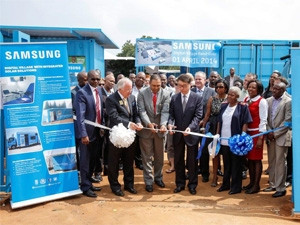
Samsung has officially handed over its Digital Village, which aims to improve the lives of Africans through renewable and environmentally sustainable solutions that harness the power of the sun.
According to Samsung, the flagship village, first unveiled in October 2013, is set up in Malibongwe Ridge, and provides the community with education and health services.
"Everyone speaks of the need to bridge the digital divide, but we can only really achieve this if we focus on the core objective of changing lives for the better," says George Ferreira, VP and COO, Samsung Africa.
To Samsung, the digital village model addresses one of Africa's largest economic challenges - electrification. On average, less than 25% of rural areas on the continent benefit from electricity, resulting in isolated communities with limited access to education, healthcare and connectivity - all of which are key to socio-economic upliftment.
"The Digital Village consists of a solar-powered Internet school. The school is exclusively solar-powered, mobile and completely independent school aims to increase accessibility to education and connectivity across Africa," says the electronics company.
"It is designed for use in remote rural areas with limited or no access to electricity. Built in a 12-metre-long shipping container, the school's solar panels provide enough energy to power the classroom's equipment. The school can accommodate up to 24 learners and has applications beyond traditional schooling - it can be used as an adult education centre in the afternoons or as a community centre on weekends."
The company notes that the Digital Village encompasses a solar power generatorthat provides easy, affordable power accessibility to schools and community centres across Africa.
A solar-powered health centre that provides a variety of eye, ear, blood, dental and pre- and post-natal screening and treatments to the community is part and parcel of the village. Within the healthcare centre, a "Mother and Child" centre will specifically provide medical services to mothers and their babies, says Samsung.
"The centre is able to move between areas to provide a range of medical services to the public. It will also focus on educating the community about health issues and encourage them to take tests as preventative measures," says the company.
To the electronics company, through the solar-powered Tele-Medical centre, the community has access to remote medical assistance through a centralised pool of medical expertise and experience. It reduces the need for qualified medical doctors in rural areas, of which there is a dire shortage, and reduces travel distances for community members. Samsung notes the advantages include faster diagnostic response times and reduced costs for rural inhabitants. The centre will work in conjunction with the Samsung Tele-Medical app, which will guide nurses through the necessary processes to ensure all relevant information is captured.
"A solar-powered admin centre will be used as an administration office by staff members," notes Samsung.
According to Sung Yong Hong, president and CEO of Samsung Africa, the organisation has set an ambitious goal for itself in Africa: to positively impact five million lives by 2015. He notes that the company believes this can most effectively be achieved if it connects its corporate citizenship initiatives with its history and core business. With the goal to grow Samsung business on the continent, the organisation also knows that it has to sustain its level of innovation. This can only be achieved if it invests in education to facilitate African thought leadership.
Samsung signed a memorandum of understanding with the Gauteng Department of Economic Development (DED), which is committed to exploring and investing in green technologies for green economies - and the digital village model aligns with this vision.
"We are encouraged by the work Samsung is doing in the green technology space. This type of out-the-box thinking is what will make a measurable and meaningful difference in people's lives and, ultimately, change the world. The Digital Village aligns with government's vision of finding alternative solutions to African problems, and we are proud to be a part of it," says Albert Chanee, head of the DED.
Share